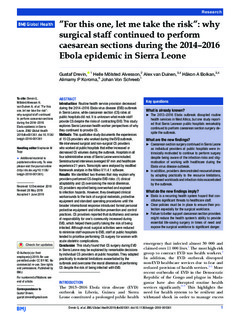| dc.contributor.author | Dreving, Gustaf | |
| dc.contributor.author | Alvesson, Helle Mölsted | |
| dc.contributor.author | van Duinen, Aalke Johan | |
| dc.contributor.author | Bolkan, Håkon Angell | |
| dc.contributor.author | Koroma, Alimamy philip | |
| dc.contributor.author | von Schreeb, Johan | |
| dc.date.accessioned | 2019-09-27T09:18:03Z | |
| dc.date.available | 2019-09-27T09:18:03Z | |
| dc.date.created | 2019-07-26T14:46:11Z | |
| dc.date.issued | 2019 | |
| dc.identifier.issn | 2059-7908 | |
| dc.identifier.uri | http://hdl.handle.net/11250/2619091 | |
| dc.description.abstract | Introduction:
Routine health service provision decreased during the 2014-2016 Ebola virus disease (EVD) outbreak in Sierra Leone, while caesarean section (CS) rates at public hospitals did not. It is unknown what made staff provide CS despite the risks of contracting EVD. This study explores Sierra Leonean health worker perspectives of why they continued to provide CS.
Methods:
This qualitative study documents the experiences of 15 CS providers who worked during the EVD outbreak. We interviewed surgical and non-surgical CS providers who worked at public hospitals that either increased or decreased CS volumes during the outbreak. Hospitals in all four administrative areas of Sierra Leone were included. Semistructured interviews averaged 97 min and healthcare experience 21 years. Transcripts were analysed by modified framework analysis in the NVivo V.11.4.1 software.
Results:
We identified two themes that may explain why providers performed CS despite EVD risks: (1) clinical adaptability and (2) overcoming the moral dilemmas. CS providers reported being overworked and exposed to infection hazards. However, they developed clinical workarounds to the lack of surgical materials, protective equipment and standard operating procedures until the broader international response introduced formal personal protective equipment and infection prevention and control practices. CS providers reported that dutifulness and sense of responsibility for one's community increased during EVD, which helped them justify taking the risk of being infected. Although most surgical activities were reduced to minimise staff exposure to EVD, staff at public hospitals tended to prioritise performing CS surgery for women with acute obstetric complications.
Conclusion:
This study found that CS surgery during EVD in Sierra Leone may be explained by remarkable decisions by individual CS providers at public hospitals. They adapted practically to material limitations exacerbated by the outbreak and overcame the moral dilemmas of performing CS despite the risk of being infected with EVD. | nb_NO |
| dc.language.iso | eng | nb_NO |
| dc.publisher | BMJ Publishing Group | nb_NO |
| dc.rights | Navngivelse-Ikkekommersiell 4.0 Internasjonal | * |
| dc.rights.uri | http://creativecommons.org/licenses/by-nc/4.0/deed.no | * |
| dc.title | ”For this one, let me take the risk”: why surgical staff continued to perform caesarean sections during the 2014–2016 Ebola epidemic in Sierra Leone | nb_NO |
| dc.type | Journal article | nb_NO |
| dc.type | Peer reviewed | nb_NO |
| dc.description.version | publishedVersion | nb_NO |
| dc.source.volume | 4 | nb_NO |
| dc.source.journal | BMJ Global Health | nb_NO |
| dc.identifier.doi | 10.1136/ bmjgh-2018-001361 | |
| dc.identifier.cristin | 1712908 | |
| dc.description.localcode | © Author(s) (or their employer(s)) 2019. Re-use permitted under CC BY-NC. No commercial re-use. See rights and permissions. Published by BMJ. | nb_NO |
| cristin.unitcode | 194,65,15,0 | |
| cristin.unitcode | 1920,0,0,0 | |
| cristin.unitname | Institutt for klinisk og molekylær medisin | |
| cristin.unitname | St. Olavs Hospital HF | |
| cristin.ispublished | true | |
| cristin.fulltext | original | |
| cristin.qualitycode | 1 | |

